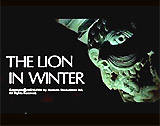
|
The Lion in Winter (1968,
UK)
In director Anthony Harvey's literate Best Picture
nominee and costume/period drama of ruthless politicial and sexual
intrigue, treason, incest, and patricide:
- the opening scene to frame the entire film - King
Henry II (Oscar-nominated Peter O'Toole) was practicing swordplay
with his youngest son: ("Come for me! You're gaining on it,
Johnny... Off you go now. Run along and practice. He'll make a
good king. He'll be ready"), and then his thoughts spoken
to his pretty mistress Princess Alais (Jane Merrow) who asked:
("Will you look down from heaven and see who's sitting on
your throne?"); he prophetically spoke: ("I must know
before I die. There's a legend of a king called Lear, with whom
I have a lot in common. Both of us have kingdoms and three children
we adore, and both of us are old, but there it ends. He cuts his
kingdom into bits. I can't do that. I've bullt an empire, and I
must know it's going to last. All of Britain, half of France. I'm
the greatest power in a thousand years, and after me comes John")
- King Henry II then he described his imprisoned, estranged
wife Duchess Eleanor of Aquitaine (Oscar-winning Katharine Hepburn):
("She is not among the things I love. How many husbands do you
know who dungeon up their wives? I haven't kept the great bitch in
the keep for ten years out of passionate attachment")
- the dramatic arrival of prison-bound, iron-willed
Eleanor released from jail by her husband King Henry II on Christmas
Eve in 1183, after journeying on a barge to his lived-in, drafty
castle-chateau; when she first greeted him, she noted: "How
dear of you to let me out of jail!"
- he quipped back: "It's only for the holidays"
The Dramatic Arrival of Estranged, Imprisoned
Wife
Eleanor of Aquitaine at Henry's Castle-Chateau
|
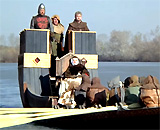
|
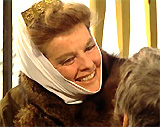
|
- the introduction of their three sons: Prince Richard
the Lionheart (Anthony Hopkins in his film debut), Geoffrey (John
Castle), and young John (Nigel Terry), and their continual feudings
about who should inherit the throne
- the scene of Eleanor's bargaining for her freedom,
in exchange for a land deal: (Eleanor: "I give the richest province
on the continent to John for what? You tell me, mastermind, for what?" King
Henry: "Your freedom....Once Johnny gets the Aquitaine, you're
free. I'll let you out. Think: On the loose in London, winters in
Provence, impromptu trips to visit Richard anywhere he's killing
people - all that for a signature"); she then described her
pain at being imprisoned for ten years and the difficult deal being
offered to her: ("Henry, I'm against the wall. To be a prisoner,
to be bricked in when you've known the world. I'll never know how
I survived. These ten years, Henry, have been unimaginable. And now,
you offer me the only thing I want, if I give up the only thing I
treasure"); then he complained about her torment of him, and
she responded that she enjoyed it: (King Henry: "Is it rich,
despising me? Is it rewarding?...Then stop!" Eleanor: "It's
what I live for")
- Eleanor's mournful monologue before a mirror about
her desolate life: ("I've lost again. I'm done for this time.
Well, there'll be other Christmases....They kissed sweetly, didn't
they? I'll have him next time. I can wait. Ah, there you are. My
comfort and my company. We're locked in for another year. Four seasons
more. What a desolation. What a life's work!")
- Eleanor's annoyed, despairing lecture to her three
feuding sons about the origins of war -- and peace: ("...It's
1183 and we're barbarians. How clear we make it. Oh, my piglets,
we are the origins of war - not history's forces, nor the times,
nor justice, nor the lack of it, nor causes, nor religions, nor ideas,
nor kinds of government, nor any other thing. We are the killers!
We breed wars! We carry it, like syphilis, inside. Dead bodies rot
in field and stream because the living ones are rotten. For the love
of God, can't we love one another just a little? That's how peace
begins. We have so much to love each other for. We have such possibilities,
my children. We could change the world!")
- King Henry's monologue about disowning his own sons:
("My life, when it is written, will read better than it lived.
Henry Fitz-Empress, first Plantagenet, a king at twenty-one, the
ablest soldier of an able time. He led men well, he cared for justice
when he could, and ruled for thirty years, a state as great as Charlemagne's.
He married out of love, a woman out of legend. Not in Alexandria,
or Rome, or Camelot has there been such a queen. She bore him many
children. But no sons. King Henry had no sons. He had three whiskered
things, but he disowned them. You're not mine! We're not connected!
I deny you! None of you will get my kingdom; I leave you nothing.
And I wish you plague. May all your children breech and die! (To
himself) My boys are gone. I've lost my boys")
- the powerful sexually-manipulative scene between wily
21 year-old King of France Philip (Timothy Dalton in his screen debut)
and Richard that revealed the eldest Prince's homosexual attraction
to Philip
- the film's best line of dialogue by Eleanor after
Henry fled: "What family doesn't have its ups and downs?"
- the joyous, crowd-pleasing ending in which Henry
bid goodbye to Eleanor when she returned to her prison keep by barge
and promised her return at Easter: (King Henry: "You know? I
hope we NEVER die!" Eleanor: "So do I!" Henry: "Do
you think there's any chance of it?")
|
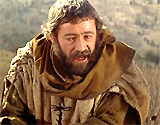
King Henry II's Swordplay with Son John
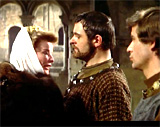

Continual Family Feudings
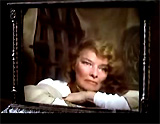
Eleanor's Monologue Before Mirror
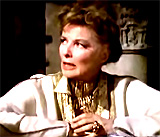
Eleanor: "We could change the world!"
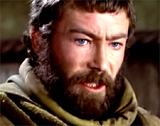
Henry's Monologue About Disowning His Own Sons
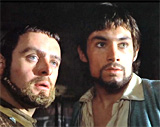
Two Sons: Richard the Lionheart (Anthony Hopkins) and
the King of France (Timothy Dalton)

Henry's Goodbye to Eleanor
|









